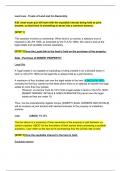Exam (elaborations)
Land Law - Trusts of Land and Co-Ownership (Exam Plan)
- Course
- Institution
These notes cover most of the topics taught on the postgraduate conversion courses in the UK (the GDL and the PGDL). They can also cover many introductory papers taught on UK undergraduate Law degrees (LLBs). This document is written in the form of step-by-step exam plans. Compared to standard n...
[Show more]



